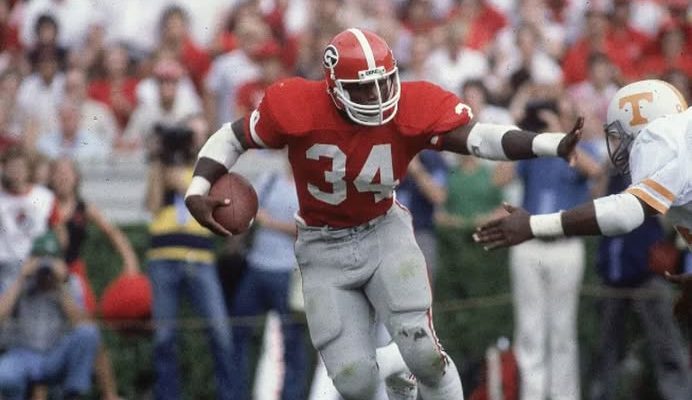**Herschel Walker Crowned Greatest Ever to Wear Number 34 in College Football History, Cementing His Legendary Legacy**
The number 34 has been worn by countless football players across generations, but none have embodied its power, grace, and dominance quite like Herschel Walker. When discussing the greatest college football players of all time, Walker’s name is not just part of the conversation—it is often the conversation. His three-year tenure at the University of Georgia from 1980 to 1982 wasn’t just spectacular; it was revolutionary, reshaping the way running backs were viewed and setting a standard that remains untouched decades later. Now, as historians, analysts, and fans reflect on the pantheon of college football legends, Walker has been universally crowned the greatest player ever to wear the number 34, solidifying his place as an immortal figure in the sport’s history.
From the moment he stepped onto the field as a true freshman, Walker was a force of nature. His blend of speed, power, and agility was unlike anything the game had seen before. Standing at 6’1” and weighing 225 pounds, he had the size of a linebacker but the breakaway speed of a sprinter—a combination that made him nearly unstoppable. In his very first game against Tennessee in 1980, he announced his arrival with a 16-carry, 84-yard performance that included a jaw-dropping touchdown run where he broke multiple tackles before outrunning the entire defense. That game was merely a preview of what was to come.
By the end of his freshman season, Walker had rushed for 1,616 yards and 15 touchdowns, leading Georgia to an undefeated season and a national championship. His performance earned him a third-place finish in the Heisman Trophy voting—an almost unheard-of achievement for a freshman at the time. But Walker wasn’t just accumulating stats; he was redefining what it meant to be a workhorse running back. He carried the ball 274 times that season, a testament to his durability and the unshakable trust his coaches had in him.
What set Walker apart wasn’t just his physical gifts but his relentless drive. He played with a ferocity that left defenders battered and demoralized. His signature stiff-arm wasn’t just a tool—it was a weapon, sending would-be tacklers sprawling to the turf. And yet, for all his power, he possessed the finesse of a back half his size, making cuts that left opponents grasping at air. His sophomore and junior seasons only further cemented his legend. In 1981, he rushed for 1,891 yards and 18 touchdowns, followed by a staggering 1,752 yards and 16 touchdowns in 1982. By the time he left Georgia for the USFL, Walker had amassed 5,259 career rushing yards—a record that stood in the SEC for decades—and 49 touchdowns, all while averaging an astonishing 5.3 yards per carry.
Walker’s impact went beyond numbers. He was the heart and soul of a Georgia program that dominated the early 1980s, and his performances in big games were the stuff of legend. His 150-yard, two-touchdown performance against Notre Dame in the 1981 Sugar Bowl clinched the national title. His 219-yard outburst against Vanderbilt in 1980 remains one of the most dominant individual performances in SEC history. And who could forget his 47-carry, 225-yard masterpiece against Florida in 1981, where he single-handedly willed the Bulldogs to victory? These weren’t just games—they were coronations, each one further proof that Walker was operating on a different plane than his peers.
The debate over the greatest college football player of all time often includes names like Jim Brown, Barry Sanders, and Archie Griffin. But when it comes to the number 34, there is no debate. Other greats have worn it—Hall of Famers like Walter Payton at Jackson State and Earl Campbell at Texas come to mind—but none matched Walker’s sheer dominance at the collegiate level. Payton was a phenom in his own right, but his NFL legacy far outweighs his college career. Campbell, while legendary, didn’t have the same three-year stranglehold on the sport that Walker did. And while modern stars like Derrick Henry (who also wore 34 at Alabama) have come close, none have replicated Walker’s combination of longevity, production, and championship pedigree.
Perhaps the most telling testament to Walker’s greatness is how he transcended the sport. He wasn’t just a football player—he was a cultural icon. At a time when college athletes rarely became household names outside of their regions, Walker was a national superstar. His face graced magazine covers, his highlights played on loop on sports networks, and his name became synonymous with excellence. Even today, decades after his final collegiate snap, his legacy looms large. Current players still speak of him in reverent tones, and his highlights remain a masterclass in running back play.
Walker’s influence extended beyond the field, too. His decision to forgo his senior season and sign with the USFL’s New Jersey Generals was groundbreaking, challenging the NFL’s monopoly on top talent and paving the way for future stars to explore alternative paths. Though his professional career was illustrious—spanning the USFL, NFL, and even a brief stint in MMA—it was his college days that defined him. Georgia retired his number 34 in 1985, a rare honor that underscored his irreplaceable impact on the program.
In an era where debates over “the greatest” are often muddied by recency bias or statistical inflation from modern pass-heavy offenses, Walker’s claim to the throne remains unchallenged. The numbers speak for themselves, but so do the moments—the electrifying runs, the championship glory, the undeniable aura of a player who knew he was destined for greatness. Herschel Walker didn’t just wear the number 34; he elevated it to mythical status. And now, as the dust settles on the endless comparisons and rankings, one truth stands above all others: there has never been, and may never be, another like him.
The crown rests comfortably on his head. The greatest to ever wear 34. The greatest to ever do it. Herschel Walker.



